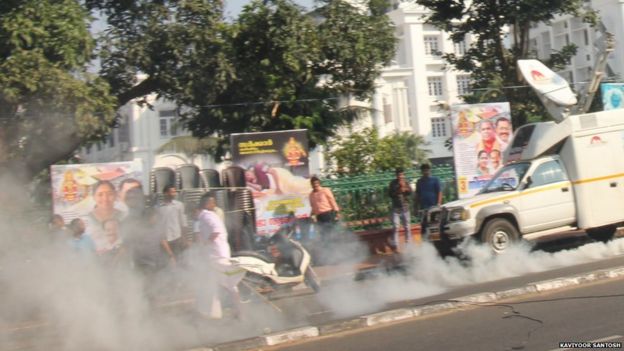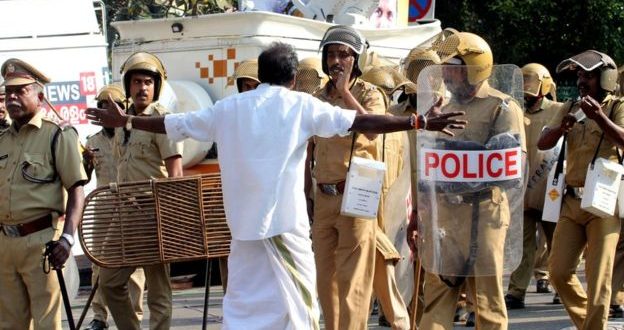The southern Indian state of Kerala has shut down amid violent protests after two women made history by entering a prominent Hindu temple.
One person was killed in clashes on Wednesday. Schools across the state are closed and public transport too has been suspended.
The Sabarimala temple was historically closed to women of “menstruating age” – defined as between 10 and 50.
The Supreme Court revoked the ban in September, which prompted outrage.
Although women tried to enter the temple since the ruling, they were forced to turn back because of massive protests.
On Wednesday, Bindu Ammini, 40, and Kanaka Durga, 39, entered the shrinearound dawn and became the first women to do so. This sparked fresh protests across the state and right-wing groups demanded a state-wide shutdown.
The two women had tried to enter the temple once before, in December, but were prevented from doing so by protesters.
As news of their entry into the temple spread, violence broke out in several cities and towns as groups of protesters clashed with police, who fired tear gas to disperse crowds.
Police told news agency AFP that at least 15 people were injured after protesters hurled stones at them.
According to local media reports, around 100 people have been arrested by police in one district, where a mob assaulted a woman police officer.
More arrests across the state are expected, police told BBC Hindi’s Imran Qureshi.
Several journalists were also attacked in the protests that engulfed the state capital, Thiruvathapuram.
Indian airlines have issued warnings to passengers travelling to Kerala.
The Supreme Court decision to let women worship at the Sabarimala shrine came after a petition argued that the custom banning them violated gender equality.
But India’s ruling party, the Hindu nationalist Bharatiya Janata Party (BJP), has argued that the ruling is an attack on Hindu values.
The issue has become increasingly contentious in the run-up to India’s general election, scheduled for April and May. Critics have accused Prime Minister Narendra Modi of pursuing a religiously divisive agenda to court the BJP’s mostly-Hindu support base.
Hinduism regards menstruating women as unclean and bars them from participating in religious rituals – but most temples allow women to enter as long as they are not menstruating, rather than banning women in a broad age group from entering at all.

Protesters have consistently argued that the court ruling goes against the wishes of the temple’s deity, Lord Ayappa.
They say that the ban on women entering Sabarimala is not about menstruation alone – it is also in keeping with the wish of the deity, who is believed to have laid down clear rules about the pilgrimage to seek his blessings.
According to the temple’s mythology, Lord Ayyappa is an avowed bachelor who has taken an oath of celibacy and hence, women of a certain age are not allowed into the temple.
Two other women had managed to reach the temple’s premises in October, with more than 100 police protecting them from stone-throwing protesters as they walked the last 5km stretch to the shrine. But they were forced to turn around after a stand-off with devotees, just metres from Sabarimala’s sanctum.
–
BBC
 UAE BARQ برق الإمارات – نبضك
UAE BARQ برق الإمارات – نبضك



